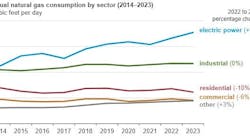Eric Watkins
OGJ Oil Diplomacy Editor
LOS ANGELES, May 20 -- The Organization of the Petroleum Exporting Countries is coming under a variety of pressures, both internal and external, ahead of the group’s planned meeting June 8 in Vienna.
The most immediate external pressure came from the governing board of the International Energy Agency, which expressed “serious concern” over growing signs that the rise in oil prices since September is affecting the global economic recovery (OGJ Online, May 19, 2011).
“As global demand for oil increases seasonally from May to August, there is a clear, urgent need for additional supplies on a more competitive basis to be made available to refiners to prevent a further tightening of the market,” IEA said, adding, “The governing board urges action from producers that will help avoid the negative global economic consequences which a further sharp market tightening could cause, and welcomes commitments to increase supply.”
The governors, in an effort to exert pressure on producers, said they were “prepared to consider using all tools that are at the disposal of IEA member countries”—a reference to the fact that IEA members hold 1.6 billion bbl of oil in strategic reserves, which could be released to stabilize the market.
Latest OPEC report
There was no immediate reaction from OPEC, but IEA’s statement, which gave no figures regarding demand or production, came just a week after OPEC’s latest market report, which forecast global oil demand growth for 2011 at 1.4 million b/d, a 20,000 b/d upward revision from its estimate the prior month.
The OPEC report was in line with a similar forecast by the US Energy Information Administration for the year's demand growth.
OPEC noted that while stronger-than-expected economic growth in China was supportive of demand, worries about the continuity of the US economic rebound and the fallout on oil demand from Japan's devastating earthquake and tsunami were keeping "oil demand estimates in an adjustment mode and…imposing a downside risk for the year's forecasts."
OPEC said, "These economic uncertainties are clouding market needs for the remainder of the year.” OPEC has argued that the surge in prices over the past couple of months is linked mainly to market speculation and not to fundamentals of supply-demand.
Ahead of the meeting next month, industry observers suspect that rivalries within OPEC, especially between Saudi Arabia and Iran, the group’s leading producers, could prevent any major decisions from being taken about output.
US-Saudi discussions
That rivalry will be intensified by a recent Associated Press report that the US and Saudi Arabia are “quietly expanding defense ties on a vast scale, led by a little-known project to develop an elite force to protect the kingdom's oil riches and future nuclear sites.”
AP’s report said the US also is in discussions with Saudi Arabia “to create an air and missile defense system with far greater capability against the regional rival the Saudis fear most, Iran.”
The report added that it is with Iran mainly in mind that the Saudis are pressing ahead with a historic $60 billion arms deal that will provide dozens of new US-built F-15 combat aircraft “likely to ensure Saudi air superiority over Iran for years.”
Meanwhile, that Saudi-Iranian rivalry is likely to be further intensified by the presence of Iran’s President Mahmoud Ahmadinejad who, in the role of his country’s oil minister, will personally attend the upcoming meeting and deliver its opening speech.
"Saudi Arabia is likely to see Ahmadinejad's presence as a direct challenge," said IHS Energy senior analyst Samuel Ciszuk. "He might raise pretty much any issue, just to get the limelight and create some form of price reaction—upwards, one has to assume," Ciszuk said (OGJ Online, May 18, 2011).
Ghanem’s defection
Added to the IEA and the Saudi-Iranian issues, OPEC ministers may feel added pressure coming from the continued civil war in Libya, especially following the reported defection of the country’s oil minister Shukri Ghanem.
That defection, yet to be confirmed by Ghanem himself, has left a void at OPEC that Libya’s rebel forces hope to fill—creating another rivalry that will affect the ministers’ upcoming meeting.
“We want to attend, and will study the legal procedure,” said Mahmud Shammam, media spokesman for the rebel National Transitional Council (NTC). “We still do not know if OPEC will invite us,” he said.
Ghanem, also chairman of Libya's National Oil Co., had been due to attend the meeting, but has issued no comment since his departure from Libya for Tunisia earlier this week and his whereabouts remain unknown.
A Tunisian official said Ghanem checked into a hotel on the island of Djerba on May 14, while the hotel said he departed with his family early on May 17 for an unknown destination.
“We have got confirmation from several sources that Shukri Ghanem is in his house in Vienna,” said Shamman. “He has not been in touch with the NTC, and the council is not interested, nor in need [of]…Ghanem.”
However, Libya's deputy foreign minister today flatly denied the reports that Ghanem had defected. "Shukri Ghanem is in his position, at work. If he's out of the country he'll be coming back," Khaled Kaim told Reuters.
Leo Drollas, chief economist of the Centre for Global Energy Studies, meanwhile said it is hard to see how anything could be accomplished at the upcoming OPEC meeting due to the variety of problems now facing the organization.
Drollas noted that while the market has become more volatile, OPEC is just sitting there, with ministers defecting, a president taking on the mantle of a minister, playing politics while the world is facing many problems on the economic front.
Contact Eric Watkins at [email protected].

